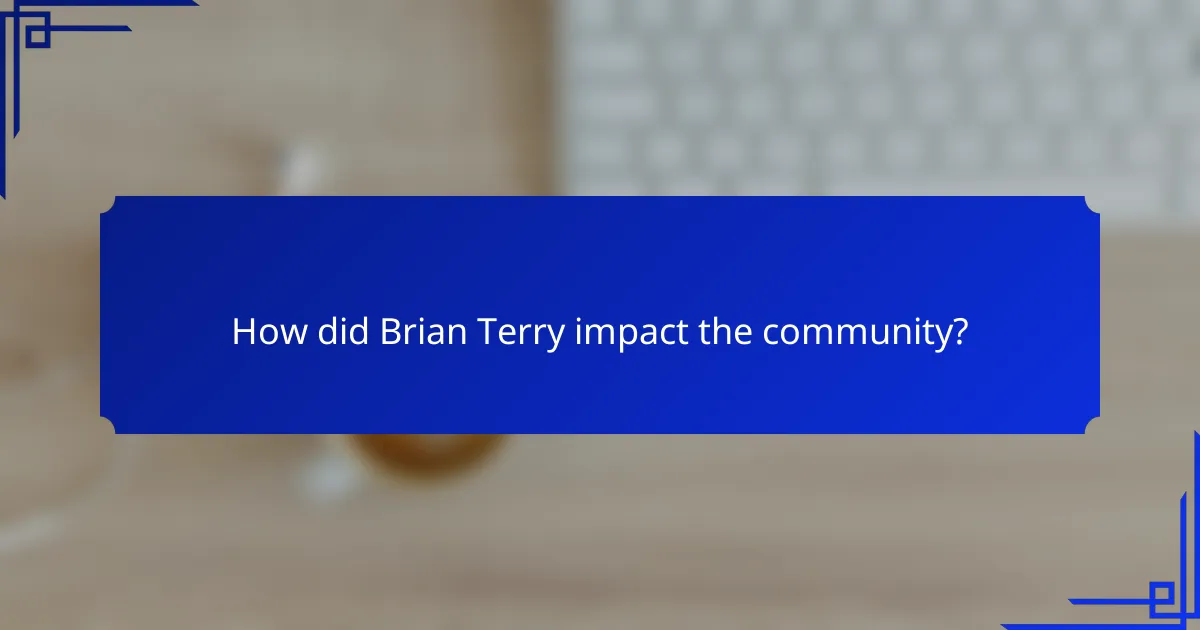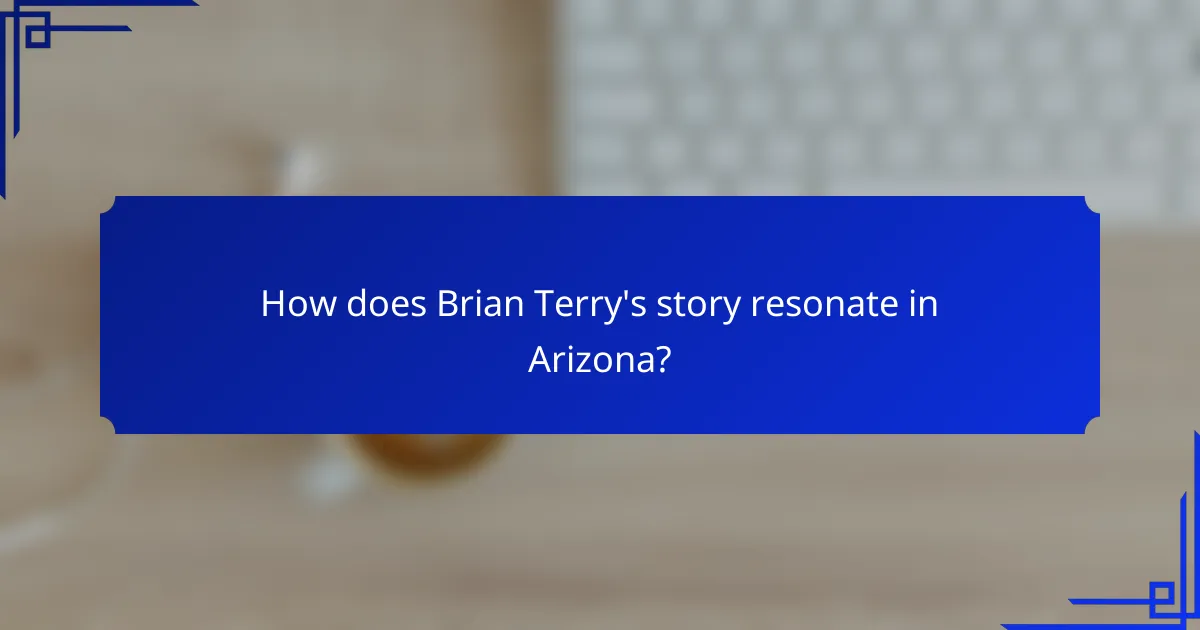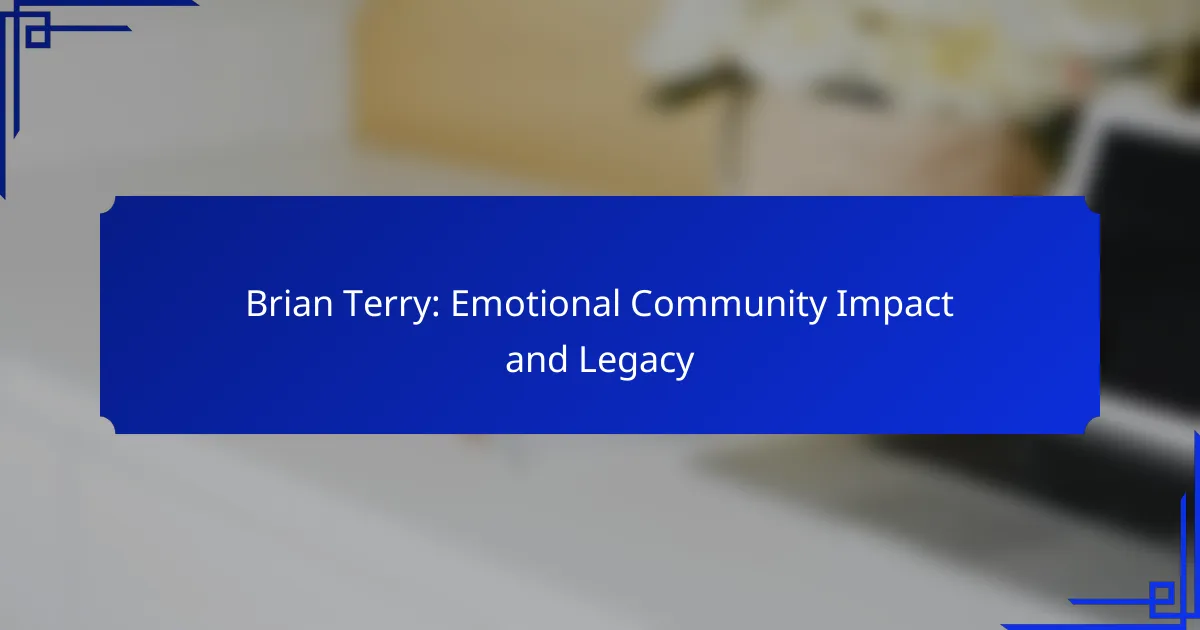Brian Terry’s tragic death as a Border Patrol agent underscored the inherent dangers faced by law enforcement and ignited vital conversations about border security and community involvement. His commitment to public safety fostered unity and resilience among residents, inspiring them to actively participate in community safety initiatives. Through memorial events and scholarship programs established in his honor, communities continue to celebrate his legacy while promoting engagement and support for future generations.

How did Brian Terry impact the community?
Brian Terry significantly impacted the community through his dedication to public safety and advocacy for law enforcement. His legacy includes fostering a sense of unity and resilience among residents, encouraging them to engage actively in community safety initiatives.
Community engagement initiatives
Brian Terry’s commitment to community engagement was evident in various programs aimed at increasing public awareness and participation in safety efforts. He organized town hall meetings and workshops that educated residents on crime prevention strategies and the importance of neighborhood watch programs.
These initiatives not only informed the community but also built trust between residents and law enforcement. By encouraging open dialogue, Terry helped create a collaborative environment where community members felt empowered to take action in safeguarding their neighborhoods.
Support for local law enforcement
Terry was a staunch supporter of local law enforcement, advocating for better resources and training to enhance their effectiveness. He recognized the challenges faced by officers and worked to secure funding for equipment and community policing programs.
His efforts included organizing fundraising events and awareness campaigns that highlighted the importance of police work in maintaining safety. By fostering a positive relationship between law enforcement and the community, Terry helped ensure that officers were seen as allies rather than adversaries.

What is Brian Terry’s legacy?
Brian Terry’s legacy centers on his role as a Border Patrol agent who was tragically killed while on duty, highlighting the dangers faced by law enforcement in border regions. His death sparked significant discussions about border security and community involvement, leaving a lasting impact on policies and activism surrounding immigration and safety.
Influence on border security policies
Brian Terry’s death prompted a reevaluation of border security policies in the United States, leading to increased funding and resources for border enforcement agencies. Lawmakers recognized the need for enhanced safety measures and more robust operational strategies to protect agents working in high-risk areas.
As a result, various initiatives were implemented, including the deployment of advanced surveillance technology and increased personnel along the U.S.-Mexico border. These changes aimed to deter illegal crossings and improve overall security, reflecting the heightened awareness of the challenges faced by border enforcement.
Inspiration for community activism
The circumstances surrounding Brian Terry’s death galvanized community activism, inspiring many to advocate for comprehensive immigration reform and better support for law enforcement. His story became a rallying point for those seeking to address the complexities of border issues and the human element involved in immigration debates.
Community organizations have since emerged, focusing on education, awareness, and policy change. Activists emphasize the importance of balancing security with compassion, encouraging dialogue between communities and law enforcement to foster understanding and collaboration in addressing border-related challenges.

How can communities honor Brian Terry?
Communities can honor Brian Terry by organizing memorial events and establishing scholarship programs in his name. These initiatives not only commemorate his legacy but also foster community engagement and support for future generations.
Memorial events and fundraisers
Memorial events and fundraisers serve as a way to celebrate Brian Terry’s life and contributions. Communities can organize walks, runs, or gatherings that encourage participation and raise awareness about his impact. These events often include opportunities for donations, with proceeds going towards causes he supported.
When planning a memorial event, consider partnering with local organizations to amplify outreach. Setting a date that aligns with significant anniversaries related to Brian Terry can enhance participation and emotional resonance.
Scholarship programs in his name
Establishing scholarship programs in Brian Terry’s name provides financial support to students pursuing education in fields related to his legacy, such as law enforcement or public service. These scholarships can help ease the financial burden on students and encourage them to follow in his footsteps.
Communities should consider collaborating with educational institutions to create scholarship criteria that reflect Brian’s values. Fundraising efforts can be directed towards building a sustainable endowment, ensuring that the scholarship continues to benefit students for years to come.

What are the emotional stories surrounding Brian Terry?
The emotional stories surrounding Brian Terry highlight the profound impact of his life and tragic death on his family, friends, and community. These narratives reflect not only personal grief but also a collective sense of loss and a call for justice and change.
Personal accounts from family and friends
Family members of Brian Terry often share heartfelt memories that illustrate his dedication and passion for his work as a Border Patrol agent. They describe him as a caring individual who valued his relationships and always sought to help others. His siblings recall times spent together, emphasizing his sense of humor and unwavering support.
Friends recount the moments they shared with Brian, highlighting his adventurous spirit and commitment to his community. Many express how his untimely death has left a void in their lives, prompting them to advocate for better border security and to honor his legacy through various initiatives.
Community testimonials
The community surrounding Brian Terry has come together to express their sorrow and admiration for his service. Local leaders and residents often speak at memorial events, sharing how his sacrifice has galvanized efforts to improve safety and security in the area. These testimonials reflect a deep appreciation for his bravery and the risks he took to protect others.
Many community members have participated in vigils and rallies, emphasizing the need for accountability and reform in border policies. The emotional resonance of Brian’s story continues to inspire collective action, as people strive to ensure that his legacy contributes to meaningful change in their community.

What lessons can be learned from Brian Terry’s life?
Brian Terry’s life teaches the importance of dedication to community and the pursuit of justice. His commitment to service and advocacy highlights how individual actions can create a lasting impact on society.
Importance of community service
Community service plays a crucial role in fostering connections and addressing local needs. Engaging in volunteer work not only helps those in need but also strengthens the fabric of the community. Individuals can participate in various activities, such as food drives, mentorship programs, or environmental clean-ups, to make a difference.
By dedicating time to community service, people can develop valuable skills and gain insights into the challenges faced by others. This engagement often inspires a sense of responsibility and encourages others to contribute, creating a ripple effect of positive change.
Advocacy for justice and safety
Advocacy for justice and safety is vital in ensuring that communities are protected and supported. Brian Terry’s legacy emphasizes the need for individuals to stand up against injustices and work towards creating safer environments. This can involve participating in local advocacy groups, attending town hall meetings, or supporting legislation that promotes public safety.
Effective advocacy requires understanding the issues at hand and mobilizing community members to take action. It is essential to communicate clearly about the goals and benefits of such efforts, as well as to collaborate with local organizations and law enforcement to foster trust and cooperation.

How does Brian Terry’s story resonate in Arizona?
Brian Terry’s story resonates deeply in Arizona, highlighting the ongoing issues of border security and the impact of drug trafficking. His tragic death has sparked conversations about law enforcement practices and community safety, making it a pivotal moment for many residents.
Local law enforcement perspectives
Local law enforcement views Brian Terry’s story as a critical reminder of the dangers faced by officers on the front lines of border security. Many police departments have since increased their collaboration with federal agencies to enhance safety protocols and improve response times in high-risk areas.
Officers emphasize the need for comprehensive training and resources to better equip them for encounters with organized crime. They advocate for community support to foster trust and cooperation between law enforcement and residents, which is essential for effective policing.
Community response and activism
The community response to Brian Terry’s story has been marked by increased activism focused on border issues and public safety. Local advocacy groups have emerged, pushing for reforms in immigration policies and greater accountability for law enforcement agencies.
Residents have organized rallies and educational events to raise awareness about the complexities of border security and its implications for their communities. This grassroots activism aims to ensure that the legacy of Brian Terry inspires positive change and fosters a safer environment for all Arizonans.

What future initiatives are inspired by Brian Terry?
Brian Terry’s legacy inspires ongoing initiatives focused on enhancing border security and fostering community support networks. These efforts aim to address the challenges of border control while promoting safety and cooperation among communities affected by immigration issues.
Ongoing advocacy for border security reform
Advocacy for border security reform has gained momentum since Brian Terry’s tragic death. Activists and organizations are pushing for comprehensive policies that balance security needs with humanitarian considerations. This includes promoting the use of technology and intelligence-sharing to improve border management.
Key initiatives often involve collaboration between local governments, law enforcement, and community organizations. Engaging stakeholders in discussions about effective border policies can lead to more informed and balanced approaches. For example, town hall meetings can serve as platforms for sharing concerns and proposing solutions.
Emerging community support networks
In response to the challenges faced by communities near the border, various support networks are emerging. These networks aim to provide resources and assistance to families affected by immigration policies and border enforcement. They often include legal aid services, mental health support, and educational programs.
Community organizations are increasingly forming coalitions to amplify their impact. By pooling resources and expertise, these groups can offer more comprehensive support to those in need. For instance, a local coalition might provide workshops on navigating immigration processes, ensuring that families have access to crucial information and assistance.
